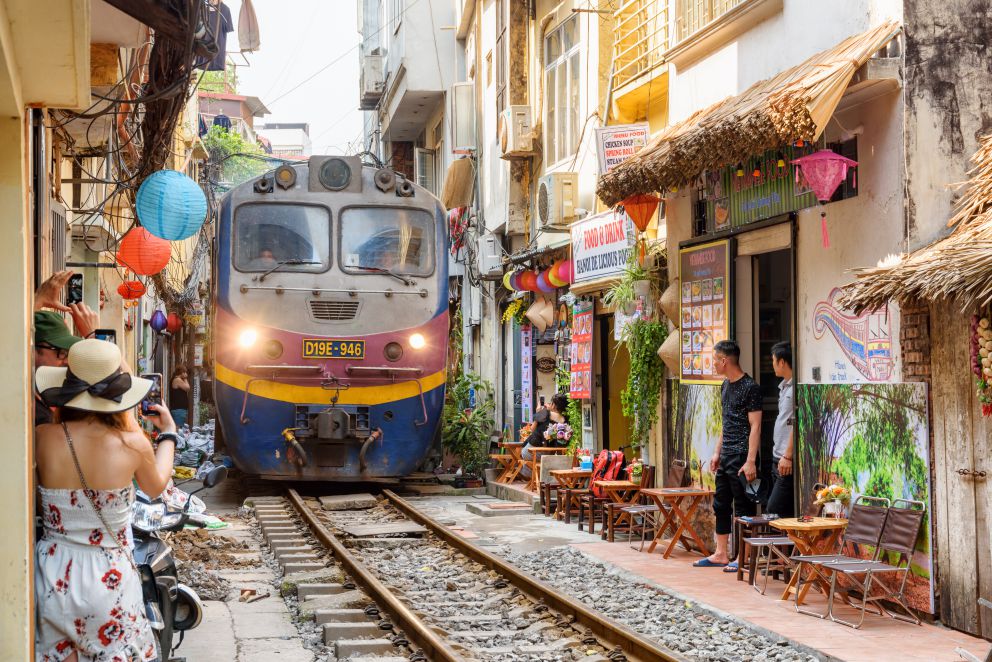Vietnam Entry Requirements
Are you considering a trip to Vietnam but feeling overwhelmed by the entry requirements? You’re not alone. Navigating the Vietnam entry requirements can be confusing due to constantly changing regulations and various visa options.
This comprehensive guide aims to provide all the necessary information you need before traveling to Vietnam. It covers visa requirements, necessary documentation, health prerequisites, customs regulations, and more. Let’s delve into the details to ensure you’re fully prepared for your upcoming trip to Vietnam.
Visa Requirements for Entering Vietnam

To enter Vietnam, the initial step is to establish whether a visa is required. Visa prerequisites for Vietnam hinge on your nationality and the length of your intended stay. Approximately 80 countries, such as the US, Canada, Australia, and many European nations, permit visa-free entry for visits lasting up to 15 days. However, if your stay exceeds 15 days or if you belong to a non-exempt country, obtaining a visa prior to your travel is necessary.
Vietnam Entry Requirements for Malaysian Citizens
Malaysian nationals can enter Vietnam without a visa for stays of up to 30 days. However, if you intend to stay longer than 30 days, you must obtain a visa beforehand. Additionally, Malaysia is among the countries eligible for an e-visa or visa on arrival when visiting Vietnam.
Vietnam Entry Requirements for UK Citizens
British citizens can enter Vietnam without a visa for up to 15 days. If they plan to stay longer, they need to acquire a visa beforehand. Alternatively, they have the option to apply for an e-visa or obtain a visa upon arrival in Vietnam.
Vietnam Entry Requirements for US Citizens
Certainly! American citizens can travel to Vietnam without a visa for stays of up to 15 days. However, if they plan to stay longer, they need to acquire a visa beforehand. Additionally, US citizens have the option to apply for an e-visa or obtain a visa upon arrival when visiting Vietnam.
Vietnam Entry Requirements for Canadian Citizens
Canadian citizens are allowed to travel to Vietnam without a visa for stays of up to 15 days. However, if they plan to stay longer, they must acquire a visa beforehand. Additionally, Canada is among the countries eligible for an e-visa or visa on arrival when visiting Vietnam.
Vietnam Entry Requirements for Australian Citizens
Australian citizens can enter Vietnam without a visa for up to 15 days. However, if they plan to stay longer, they need to acquire a visa beforehand. Additionally, Australians are eligible for an e-visa or a visa on arrival when visiting Vietnam.
Vietnam Entry Requirements for New Zealand Citizens
New Zealand citizens can visit Vietnam for up to 15 days without a visa. However, if they plan to stay longer, they need to acquire a visa beforehand. Additionally, New Zealand citizens have the option to apply for an e-visa or obtain a visa upon arrival when visiting Vietnam.
Vietnam Entry Requirements for Indian Citizens
Indian nationals are required to acquire a visa prior to traveling to Vietnam. They do not qualify for visa-free entry or e-visas. The visa application procedure for Indian citizens may take more time compared to other nationalities, therefore it is advisable to submit the application well ahead of the intended travel date.
Vietnam Entry Requirements for EU Citizens
Most European citizens (excluding Russians) can travel to Vietnam without a visa for up to 15 days. However, if they plan to stay longer, they need to acquire a visa beforehand. Additionally, many EU citizens are eligible for e-visas or visas on arrival when visiting Vietnam.
Vietnam Entry Requirements for Irish Passport Holders
Irish citizens can travel to Vietnam without a visa for visits lasting up to 15 days. However, if they plan to stay longer, they will need to acquire a visa beforehand. Alternatively, Ireland is among the countries eligible for an e-visa or a visa on arrival when visiting Vietnam.
….
Types of Visas Available for Vietnam

If you need to obtain a visa for your trip to Vietnam, there are several options available depending on your purpose of visit and duration of stay.
- E-visa: This is a convenient option for citizens of eligible countries planning short tourist trips (maximum 30 days). The application can be done online and the visa is issued electronically. However, not all nationalities are eligible for an e-visa.
- Visa on arrival (VOA): This option allows you to apply for a visa upon arrival at major airports in Vietnam. You’ll need to pre-arrange a visa approval letter before traveling. The process is simple and straightforward, but it’s important to note that this type of visa is only valid for air travel.
- Embassy visa: For longer stays, business trips, or other specific purposes, you can apply for a visa at the Vietnamese embassy or consulate in your home country. This visa must be obtained before your trip and may require additional documentation.
It’s important to note that the type of visa you choose will depend on your individual circumstances and the purpose of your visit. It’s recommended to research and compare the different options to determine which one is best for you.
Applying for a Vietnam Visa: Online vs. On Arrival

Both online and on-arrival visa applications have their advantages and disadvantages. Let’s take a closer look at each option to help you decide which one is right for you.
Online Visa Application
The e-visa application process is simple and can be done from the comfort of your own home. All you need is a valid passport, a digital photo, and a credit/debit card for payment. The processing time for an e-visa is typically 3 working days and the cost is $25 USD.
Pros:
- Convenient and time-saving.
- No need to visit an embassy or consulate.
- Can be used for both air and land travel.
Cons:
- Not all nationalities are eligible.
- Limited to a maximum stay of 30 days.
- Cannot be extended or changed once issued.
On-Arrival Visa
To obtain a visa on arrival, you’ll need to pre-arrange a visa approval letter through a travel agency or through the official Vietnam Immigration Department website. You’ll then present this letter at the visa on arrival counter at the airport along with your passport, photo, and visa fee payment (in cash). The processing time for a visa on arrival is typically 2 working days and the cost is $25 USD (for single entry) or $50 USD (for multiple entries).
Pros:
- Can be obtained without visiting an embassy or consulate.
- Suitable for those who have last-minute travel plans.
- Can be used for both air and land travel.
Cons:
- Only valid for air travel.
- Long wait times at the airport.
- Risk of rejection if the supporting documents are not in order.
The decision between an e-visa and visa on arrival ultimately depends on your personal preferences and needs. If you have more time and prefer to avoid any potential hassles at the airport, an e-visa may be the better option. However, if you have a last-minute trip or will only be traveling by air, a visa on arrival may be a suitable choice.
Required Documents for Vietnam Visa Application

The documents required for a Vietnam visa application vary based on the visa type and your nationality. Here are some general requirements.
- Valid passport: Your passport must have at least 6 months of validity remaining and blank pages for the visa sticker.
- Digital photo: A recent color photo (taken within the last 6 months) with a white background is required for both e-visa and visa on arrival applications. Make sure your face is clearly visible and there are no obstructions such as hats or sunglasses.
- Supporting documents: Depending on your purpose of visit, additional supporting documents may be required. For example, if you’re applying for a business visa, you may need to provide a letter from your company or an invitation letter from a Vietnamese business partner.
It’s important to check the specific requirements for your nationality and type of visa before submitting your application to avoid any delays or rejections.
Visa Fees and Processing Time
The cost and processing time for a Vietnam visa can vary depending on your chosen type of visa and processing method. Here’s a general overview:
- E-visa: The cost is $25 USD and the processing time is typically 3 working days.
- Visa on arrival: The cost is $25 USD (single entry) or $50 USD (multiple entries) and the processing time is typically 2 working days. Additional fees may apply if you use a travel agency for your visa approval letter.
- Embassy visa: The cost and processing time may vary depending on your nationality and the embassy/consulate you apply at. It’s best to contact the embassy directly for this information.
Passport Validity Requirements for Entering Vietnam
Your passport needs to be valid for at least 6 months from your entry into Vietnam. If it’s expiring within 6 months, renew it before traveling. Also, ensure there’s at least one blank page for the visa sticker.
Health Requirements and Vaccinations for Entering Vietnam
As of now, there are no compulsory vaccinations required for entry into Vietnam. Nonetheless, it’s advisable to ensure that routine vaccinations like measles-mumps-rubella (MMR), diphtheria-tetanus-pertussis, varicella (chickenpox), polio, and influenza are up to date before traveling. It’s also recommended to speak with your healthcare provider regarding any extra vaccinations or health measures that may be necessary based on your personal health and planned activities in Vietnam.
Customs Regulations for Entering Vietnam
Vietnam has stringent customs regulations that you should be familiar with before traveling. Certain items are strictly prohibited, such as weapons, firearms, explosives, drugs, and pornography. Additionally, it’s important to note that bringing in more than $5,000 USD in cash without declaring it is also prohibited.
You can bring personal items like cameras, laptops, and souvenirs for your own use. Yet, if you have items intended for commercial purposes, they might be taxed during import or export. It’s advisable to consult the Vietnam Customs Department for a comprehensive guide on rules and limitations.
Extension of Stay Options for Visitors in Vietnam
If you wish to extend your stay in Vietnam, there are a few options available depending on your visa type and purpose of visit.
- E-visa: The e-visa is only valid for single entry and cannot be extended. You’ll need to leave Vietnam and apply for a new e-visa if you wish to re-enter.
- Visa on arrival: This type of visa can be extended at the Vietnam Immigration Department. The process typically takes 5-7 working days and costs vary depending on the length of extension.
- Embassy visa: If you have a visa obtained from an embassy, you can apply for an extension at the Immigration Department or the agency who sponsored your visa. The cost and processing time may vary depending on the embassy/agency.
It’s important to note that overstaying your visa in Vietnam can result in penalties and difficulties when departing the country. It’s recommended to consult with the Immigration Department or a travel agency for more information on extending your stay.
Frequently Asked Questions about Vietnam Entry Requirements
Planning your trip to Vietnam? Here are some frequently asked questions about entry requirements:
Do I need a visa to enter Vietnam?
It depends on your nationality. Citizens of 22 countries are exempt from visas for stays of 15 to 30 days. You can find the full list of visa-exempt countries and their respective durations on the Vietnam Immigration website.
If your country is not on the visa-exempt list, you will need to obtain a visa before entering Vietnam. You can get a visa on arrival (VOA) at major airports, apply for an e-visa online, or visit a Vietnamese embassy or consulate in your home country.
What documents do I need to apply for a visa?
The required documents for a visa application may vary depending on your nationality and the type of visa you are applying for. However, some standard documents include:
- A valid passport with at least six months of validity remaining after your intended departure date from Vietnam.
- Two passport-sized photographs.
- A completed visa application form.
- Proof of onward travel (e.g., flight booking).
- Proof of sufficient funds (e.g., bank statement).
- Visa fee payment confirmation.
How long does it take to process a visa application?
The processing time for a visa application can vary depending on the type of visa and the workload of the Vietnamese embassy or consulate. VOA applications typically take 1-2 days, while e-visa applications can be processed within 3 days. Applications submitted at Vietnamese embassies or consulates may take longer, up to 10 working days.
What are the COVID-19 entry requirements for Vietnam?
As of today, October 27, 2023, Vietnam has lifted most COVID-19 entry restrictions. Travelers are no longer required to show proof of vaccination or a negative COVID-19 test result upon arrival. However, it is recommended to be fully vaccinated against COVID-19 and to follow basic health and hygiene measures.
Conclusion
Understanding the entry requirements might seem overwhelming, but with this detailed guide, you should have all the necessary information for a seamless and stress-free arrival in Vietnam. It’s crucial to review the specific prerequisites based on your nationality and visa type before initiating the application process. Additionally, ensure that you allocate sufficient time for processing. By approaching this with careful planning and preparation, you’ll soon be set to relish everything Vietnam has in store for you. Wishing you safe and pleasant travels!

I am a Nigerian National currently working and living in the UK.
kindly let me know the documents i need to apply for the visa and if i can do an online application.